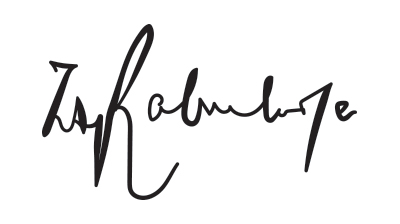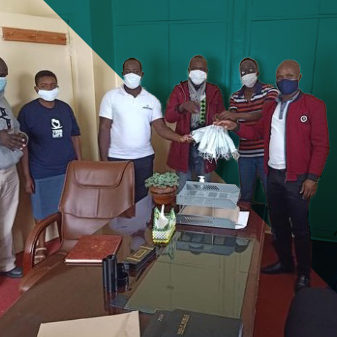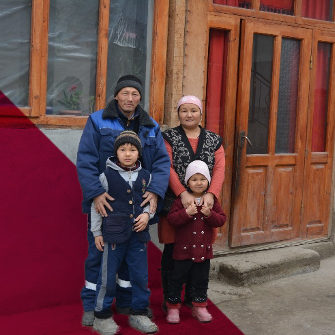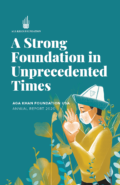A Strong Foundation in Unprecedented Times
Aga Khan Foundation USA
Annual Report 2020
No one could have fully prepared for the events of 2020.
Our decades of work to build a strong foundation in health, education, and economic inclusion helped many endure these unprecedented times.
Projects like the 2019 expansion of the Gilgit Medical Center in Pakistan helped ensure AKDN’s ability to provide a robust response to the pandemic.
AKDN/Christopher Wilton-Steer
Contents
LEFT: Көп жаша! roughly translates to “Live Long!” in Kyrgyz, and is the name of a campaign supported by the Aga Khan Foundation and USAID’s Local Impact program in the Kyrgyz Republic. Using traditional and social media, the campaign promotes best practices for both physical and mental health during the pandemic. See more at the Көп жаша! Instagram
Contents
ABOVE: Көп жаша! roughly translates to “Live Long!” in Kyrgyz, and is the name of a campaign supported by the Aga Khan Foundation and USAID’s Local Impact program in the Kyrgyz Republic. See more at the Көп жаша! Instagram
Welcome
Dear friends,
2020 was a difficult year, both for the communities we serve and for many of us here in the US. Our decades of work to build a strong foundation in health, education, and economic inclusion helped many endure these unprecedented times. But they also needed urgent help to weather what was more than a health crisis, but an education, gender, and economic crisis as well.
Worldwide, school closures affected more than 200 million students, and the number of severely hungry people was estimated to double to 270 million. Women handled the majority of the unexpected and unpaid caregiving duties, and gender-based violence increased because of the isolation of distancing measures.
As an agency of the Aga Khan Development Network (AKDN), the Aga Khan Foundation (AKF) worked to help meet both the immediate and long-term needs arising from the pandemic. AKDN developed a COVID-19 response framework to guide our coordinated response within three priority pillars.
In this year’s report, you’ll find stories of how AKF responded within each of these pillars, including how our programs provided care to remote communities in Tajikistan, supported Kenyan organizations meeting local needs, and helped farmers sustain food security in the Kyrgyz Republic.
As AKF and the AKDN began an urgent humanitarian response to meet the needs created by the coronavirus, many of our supporters wanted to help. We created the Global Pandemic Relief Fund and were heartened by the generous support of American donors even during such a time of uncertainty here at home.
Our volunteers and donors in the US also came together to support AKF’s ongoing programs through the Virtual Voyage, even as COVID-19 prevented us from hosting in-person events for the first time.
It’s clear that the work of the Aga Khan Foundation is needed now more than ever. There is a long road ahead of us, especially as we now look to address the prolonged needs stemming from the pandemic. Thank you for your continued partnership as we persevere through difficult times and strengthen the foundation for a brighter future for us all.

Sherina Ebrahim
National Committee Chair

Zahid Rahimtoola
National Committee Vice Chair
103-year-old Mr. Aziz Abdul Alim survived COVID-19 with care from an Emergency Response Center launched by the Aga Khan Health Service in Upper Chitral, Pakistan. His inspiring story and the work of the Aga Khan Development Network was covered by news organizations worldwide.
Watch a video about Mr. Alim’s experience and see NPR’s coverage of his story.
Our COVID-19 response has three pillars:
1. Slow and stop the spread
of COVID-19 and prevent outbreaks
2. Provide optimized care for all,
but especially the critically ill
3. Minimize the impact
on vulnerable populations, communities, social services, and the economy




